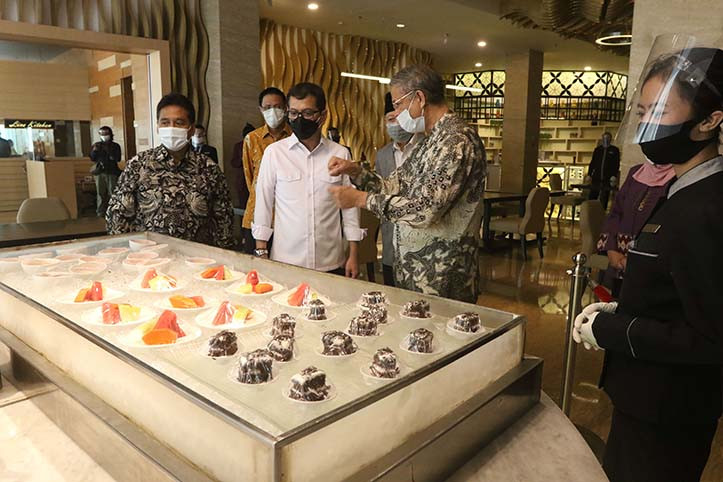Popular Reads
Top Results
Can't find what you're looking for?
View all search resultsPopular Reads
Top Results
Can't find what you're looking for?
View all search resultsIndonesia bolsters recovery measures for suffering tourism industry
Change text size
Gift Premium Articles
to Anyone
T
he Indonesian government is intensifying efforts to aid in the recovery of the tourism sector, which has been severely hit by the economic effects of COVID-19. The measures focus on developing health protocols and improving tax incentives in the industry.
On Wednesday, Tourism and Creative Economy Minister Wishnutama Kusubandio visited JS Luwansa Hotel and Convention Center in South Jakarta, where the government’s health protocols were being simulated.
“We must demonstrate our confidence to domestic and international consumers that health protocols here have been implemented seriously and in detail so that we can soon restore the tourism sector, which had been affected the most by COVID-19,” Wishnutama said during a meeting.
The minister said he was optimistic about the reopening of tourism after seeing the successes of hotels and restaurants. He expressed hope that meeting, incentive, convention and exhibition (MICE) events would soon resume.
The Wednesday meeting was attended by Jakarta Deputy Governor Ahmad Riza Patria, who provided an update on the situation in the capital to officials from several ministries, as well as thousands of virtual participants, including local government officials and business players.
Health Ministry Public Health Director General Kirana Pritasari said Indonesia was set reopen tourism before it reopened the educational sector as the “new normal” commenced in some provinces.
“A major challenge is that Indonesians need to have the opportunity to be productive but also safe. We cannot continue avoiding [COVID-19] while a vaccine does not yet exist. We must improve our prevention efforts,” Kirana said.
To help clarify health protocols in public places and facilities, the Tourism and Creative Economy Ministry has recently launched handbooks for the tourism sector.
The ministry says it has also developed recovery acceleration strategies involving products, events, marketing, communications and investment.
The ministry has reached 300,000 tourism workers throughout Indonesia in its food assistance programs. It has also launched labor-intensive programs in Central and West Java to boost revenue in villages that have missed out on income from tourism.
The National Disaster Mitigation Agency (BNPB) reported that because of the pandemic, Indonesia had suffered Rp 1,110 trillion (US$76 billion) in losses, Rp 162 trillion of which was from the tourism sector.
“Tourism is like two sides of a coin; the beauty of nature holds not only economic potential but also the potential for disaster, economic losses and claiming lives,” BNPB director Yolak Dalimunthe said.
From March 21 to June 10, the government offered tax incentives for workers and businesses, including those in the tourism sector, as stipulated in Finance Ministerial Regulation (PMK) No. 44/2020.
Directorate General of Taxation spokesman Hestu Yoga Saksama said that although the regulation covered all tourism and creative economy subsectors, the implementation of the tax incentives in the industry had not been optimal.
“They have reached only 200,000 of the 2.4 million registered taxpayers in the sector. We are coordinating with associations to assess where the problem lies,” Hestu said, adding that the government had allocated Rp 695.20 trillion for COVID-19 countermeasures.










